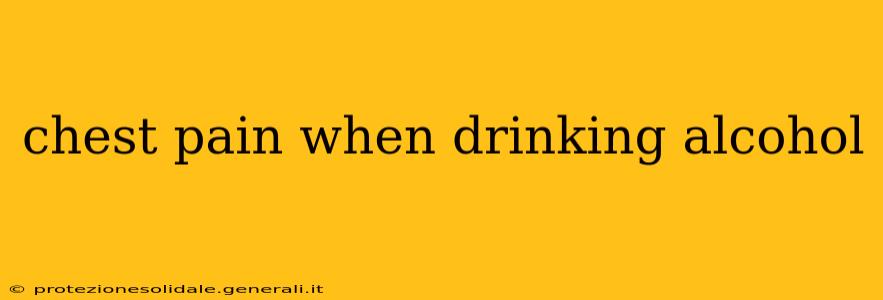Experiencing chest pain after drinking alcohol can be alarming. While sometimes it's a relatively benign issue, it can also signal a serious underlying health problem. This comprehensive guide explores the various causes of chest pain associated with alcohol consumption, helping you understand the symptoms and when immediate medical attention is necessary.
What Causes Chest Pain After Drinking Alcohol?
Several factors can contribute to chest pain after alcohol consumption. These range from relatively harmless issues to life-threatening conditions. It's crucial to understand the possibilities:
1. Acid Reflux (GERD)
Alcohol relaxes the lower esophageal sphincter (LES), the muscle that prevents stomach acid from flowing back into the esophagus. This relaxation can lead to heartburn and chest pain, often mistaken for a heart attack. Symptoms of GERD include burning sensation in the chest, sour taste in the mouth, and difficulty swallowing.
2. Heart Conditions
Alcohol can exacerbate existing heart conditions or trigger new ones. Conditions like angina (chest pain due to reduced blood flow to the heart) can be worsened by alcohol's effects on blood vessels. Heavy alcohol consumption can also contribute to cardiomyopathy (weakening of the heart muscle) and arrhythmias (irregular heartbeats), both of which can cause chest pain.
3. Panic Attacks
Alcohol can trigger or worsen anxiety and panic attacks. The physical symptoms of a panic attack, including rapid heartbeat, shortness of breath, and chest pain, can be particularly intense and frightening.
4. Esophageal Spasms
Alcohol can cause the muscles in the esophagus to spasm, leading to intense chest pain. These spasms can be sudden and severe, often mimicking the pain of a heart attack.
5. Pericarditis
This is an inflammation of the pericardium, the sac surrounding the heart. While not directly caused by alcohol, heavy drinking can increase the risk of pericarditis, which can present with sharp chest pain.
6. Pleurisy
Similar to pericarditis, pleurisy (inflammation of the lining of the lungs) is not directly caused by alcohol, but heavy drinking can weaken the immune system and increase susceptibility to infections that can lead to pleurisy, resulting in chest pain.
7. Gallbladder Issues
Alcohol can trigger gallbladder attacks in individuals with existing gallbladder problems. These attacks can cause intense pain in the upper right abdomen that can radiate to the chest.
8. Costochondritis
This condition involves inflammation of the cartilage connecting the ribs to the breastbone. While not directly linked to alcohol, alcohol's potential to weaken the immune system might play a role in its development, leading to chest pain.
How Can I Tell if My Chest Pain is Serious?
Distinguishing between harmless and serious chest pain is crucial. Seek immediate medical attention if you experience:
- Sudden, severe chest pain: This is a hallmark symptom of a heart attack.
- Chest pain accompanied by shortness of breath, sweating, nausea, or dizziness: These are classic indicators of a heart attack.
- Chest pain that radiates to the arm, jaw, neck, or back: This is another sign of a potential heart attack.
- Chest pain that persists or worsens despite rest or medication: This indicates a need for professional assessment.
What Should I Do if I Experience Chest Pain After Drinking?
If you experience chest pain after drinking, it's essential to:
- Stop drinking immediately.
- Rest and monitor your symptoms.
- Take over-the-counter pain relievers (like ibuprofen or acetaminophen) if needed, following dosage instructions carefully.
- Seek medical attention if symptoms worsen or persist.
Is it safe to drink alcohol if I have chest pain sometimes?
No, it's generally not safe to drink alcohol if you experience recurring chest pain. Alcohol can exacerbate many underlying conditions that cause chest pain. Consult your doctor to determine the cause of your chest pain and discuss the safest course of action, which might include avoiding alcohol entirely.
Can chest pain be caused by alcohol withdrawal?
While not directly chest pain, alcohol withdrawal can cause intense physical symptoms like tremors, anxiety, and rapid heartbeat, which might feel like chest discomfort or tightness. If you're experiencing alcohol withdrawal, seeking medical help is essential.
When should I go to the ER for chest pain after drinking?
Go to the emergency room immediately if your chest pain is sudden, severe, accompanied by other symptoms like shortness of breath or sweating, or if it doesn't improve after resting. Don't hesitate to seek immediate medical attention if you are concerned.
This information is for general knowledge and does not constitute medical advice. Always consult a healthcare professional for any health concerns. They can accurately diagnose the cause of your chest pain and recommend the appropriate treatment plan.
